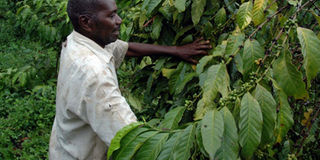Nagojje abandons clonal for robusta coffee

Agriculturists advise that diseased crops be uprooted immediately. Below left, robusta coffee and right below, clonal coffee. FILE/NET PHOTOS
“The year coffee dried up in our plantation was the year I stopped going to school. My father died when I was in Primary One and since then, coffee had taken care of our household needs,” said Edith Namirembe, an emotional farmer at a farmers meeting in Nagojje Sub County in Mukono District. Farmers are very concerned about why coffee which for long has been Uganda’s leading export, is these days failing them. Why their sons and daughters no longer able to go further with their studies, because the parents cannot afford their school fees. Like many other farmers who spoke after her, Namirembe said the new type of coffee, clonal coffee is hard to maintain and yet, the olden day’s coffee such as Arabica and Nassaranda were easy to grow and maintain.
Moses Kayizzi told the meeting that traditional coffee had a good scent and taste, which is different from the coffee grown today. He said he had actually, started going back to the bushes, to search for this coffee and is now planting it.“Much as they are also affected by pests, they are not as badly affected by them as the clonal coffee. And our old coffee had bigger seeds. That is why our grandparents planted it and we also found it still being grown,” he said. Kayizzi went on to say; “Even the wood gotten from these old types of coffee is better for firewood.”
Kayizzi explained; “Even if you had just left that coffee in the bush, unattended to, you could still go back, pick it and pay school fees for your children,” he told the attentive farmers. Another farmer Regina Ssemuddu explained further why clonal coffee was giving local farmers a lot of problems. She said compared to our traditional coffee, clonal coffee does not have tap roots and that is why it cannot be easily maintained. “One can only benefit from this type of coffee, if they gave it a lot of care, which most farmers are not capable of doing,” she said. Clonal coffee she added can be maintained by large scale commercial farmers who have all what it takes to grow it. “Don’t go around planting all sorts of coffee, plant the type which you can sustain.” She said, multinational companies were selling pesticides simply because they want to make money, and yet when farmers finally penetrate the international market, buyers tell them they cannot buy coffee which is sprayed with pesticides “Let’s go back to covering the soils in our gardens, the way our grandparents did, instead of using pesticides because our coffee will not be bought,” she advised them.
Abdallah Kijambu, a senior farmer with Naads said he too was concerned about the fact that coffee is drying up, and there is not enough money made from it. But he said no one can avoid growing this coffee which was introduced by the white man. “You can go back and grow the traditional coffee, but you cannot do without clonal coffee because it has the market,” he said. Mr Kijjambu advised farmers on how best to grow the coffee and benefit from it. He said he grows this kind of coffee, and he loses some of it to diseases but because of the good practices he applies at least, he gets something out of it.
“Just like when people die and they don’t stop producing, coffee too dies, and we should keep planting more but smartly,” he said. He added; “If you want good coffee, look out for a good nursery bed. Make inquiries about that nursery bed before you buy coffee from it,” he said. He told them that some owners of these nursery beds are simply after money, and they sell people coffee which they know is not good.
Kijjambu asked farmers to fall in love with their job, if they are to gain from it. He told them when a coffee plant catches disease, farmers should uproot it immediately. And that, two pangas should be used, one to cut the diseased plant and another on the healthy ones. Ahmed Wamala another farmer emphasised the need for farmers to intercrop coffee with other crops for their food security, because if they did not, they would end up abandoning their coffee plantations to search for food. He went on to say, too much digging in the coffee plantations, escalates diseases because when a hoe which has touched a sick coffee plant, is used on a healthy plant it will infect it with the disease. The dialogue left farmers educated and informed and most of them vowed to practice what they had been taught. It was organised by Farmers Media Link ltd with the aim of bridging the gap between farmers and the media.




